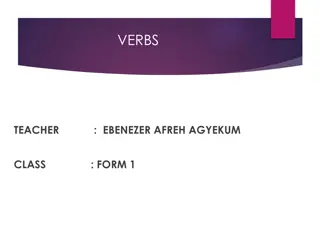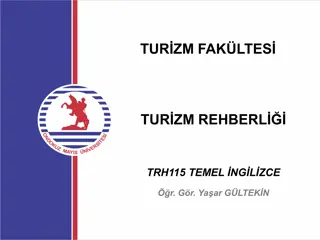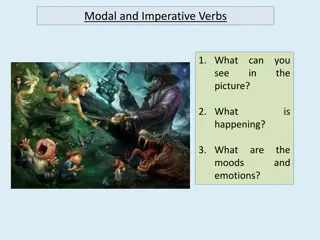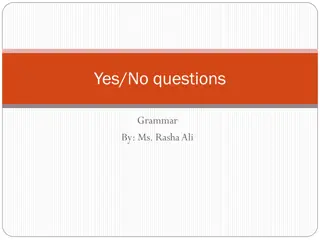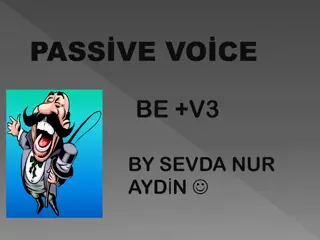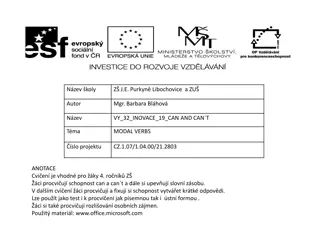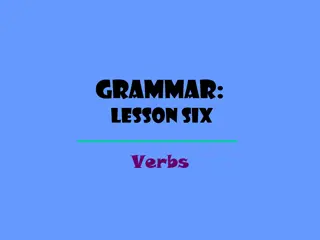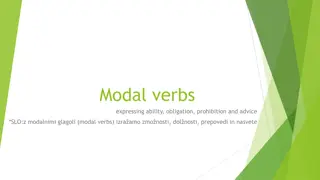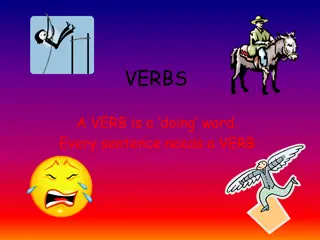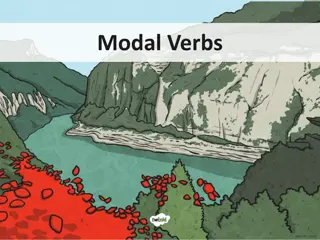Understanding Modal Verbs in English Grammar
Explore the nuances of modal verbs in English grammar through opinion, advice, and exercises. Learn how to use modal verbs like should, ought to, can, must, and may in present and future contexts. Enhance your language skills with examples and exercises highlighting the correct usage of modal verbs.
Download Presentation

Please find below an Image/Link to download the presentation.
The content on the website is provided AS IS for your information and personal use only. It may not be sold, licensed, or shared on other websites without obtaining consent from the author. Download presentation by click this link. If you encounter any issues during the download, it is possible that the publisher has removed the file from their server.
E N D
Presentation Transcript
D I G ENG M.2 Sem. 1 Grammar Modal verbs present and future Opinions and advice ( ) should shouldn t (advice). I think the police should arrest hooligans. (opinion) I think you should talk to your teacher about it. (advice) I T A L 4.0
D I G ENG M.2 Sem. 1 Grammar Modal verbs present and future Opinions and advice ( ) ought to ought not to should shouldn t. - Ought to should ought to I think she ought to talk to her teacher about it. I T A L 4.0
D I G ENG M.2 Sem. 1 Grammar Modal verbs present and future Opinions and advice ( ) - Ought to 3 s , Ought do/does. You ought not to go. Ought we to tell the director? I T A L 4.0
D I G ENG M.2 Sem. 1 Grammar Modal verbs present and future Opinions and advice ( ) think I don t think + should should ought to. I don t think you should/ought to go. I T A L 4.0
D I G ENG M.2 Sem. 1 Grammar Modal verbs present and future Opinions and advice ( ) Had better Had I think you d better talk to your teacher about it. We d better not forget to turn off the computer! I T A L 4.0
D I G ENG M.2 Sem. 1 Grammar Modal verbs Exercise 1: Underline the correct word or phrase in each sentence. 1. Look at those clouds. I think it can/might/must rain. 2. This is impossible! It can t be/mustn t be/may not be the answer. 3. Well done! You may be/must be/might be very pleased! 4. I ve no idea where Jane is. She could be/must be anywhere! 5. I suppose it s possible. I might/can/must come to your party. I T A L 4.0
D I G ENG M.2 Sem. 1 Grammar Modal verbs Exercise 1: Underline the correct word or phrase in each sentence. 6. I m not sure. I must not/may not be able to get there in time. 7. That can t be/mustn t be/may not be Tom. He hasn t got a bike. 8. Anna isn t here yet. She can be/must be on her way. 9. There s someone at the door. It can be/could be the postman. 10. Sorry, I can t come/may not come out tonight. I have to do my homework. I T A L 4.0
D I G ENG M.2 Sem. 1 Grammar Modal verbs Exercise 2: Rewrite each sentence using can, can t, might or must, and beginning and ending as shown. 1. Sarah is really good at swimming. Sarah . can swim really well. 2. It s possible that our team will win. Our team win. 3. I m sure this is the right road. This this right road. I T A L 4.0
D I G ENG M.2 Sem. 1 Grammar Modal verbs Exercise 2: Rewrite each sentence using can, can t, might or must, and beginning and ending as shown. 4. I m sure you work very hard! You . very hard! 5. Polly isn t allowed to come to our party. Polly to our party. 6. It s possible that I ll see you tomorrow, but I m not sure I ., but I m not sure. I T A L 4.0
D I G ENG M.2 Sem. 1 Grammar Modal verbs Exercise 2: Rewrite each sentence using can, can t, might or must, and beginning and ending as shown. 9. Excuse me, is it all right if I open the window? Excuse me, ..the window? 10. I suppose you re Mrs. Pim. How do you do? You .Mrs Pim. How do you do? I T A L 4.0
D I G ENG M.2 Sem. 1 Grammar Modal verbs Exercise 3: Decide whether each pair of sentences have a similar meaning, or whether they are different. Write S for same or D for different. 1. You d better go 2. You don t have to press this button. You mustn t press this button. 3. You should have a rest. 4. You must be crazy! 5. You must be here before 8.30. You have to be here before 8.30. I T A You should go. S L You ought to have a rest. 4.0 You should be crazy!
D I G ENG M.2 Sem. 1 Grammar Modal verbs Exercise 3: Decide whether each pair of sentences have a similar meaning, or whether they are different. Write S for same or D for different. 6. You mustn t do that! that! 7. You shouldn t eat so much. much. 8. We have to work harder. 9. I d better write my letters. 10. I ought to leave now. I have to leave now. I T A You don t have to do You ought not to eat so L We must work harder. 4.0 I must write my letters.





